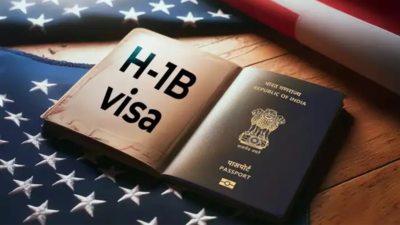ARTICLE AD BOX

US President Donald Trump’s decision to impose a hefty annual fee of $100,000 on H-1B visas has triggered widespread debate. Indian industry leaders, political voices and community representatives have all weighed in, warning that the move could backfire on the US while benefiting India.
What is changing?
On Friday, Trump signed a proclamation introducing a mandatory annual fee of $100,000 on H-1B visas, effective from Sunday. Currently, H-1B filing fees range from $2,000 to $5,000, depending on the employer's size. The visas, valid for three years and renewable, are widely used by American companies to bring in highly skilled foreign professionals, many from India.Trump defended the decision as a measure to protect American jobs, arguing that outsourcing firms have used the programme to replace US workers with cheaper foreign talent.
He described it as both an economic and national security issue.
“America’s loss will be India’s gain”
Former Niti Aayog CEO Amitabh Kant was among the first to react strongly. “Donald Trump’s 100,000 H-1B fee will choke US innovation, and turbocharge India’s. By slamming the door on global talent, America pushes the next wave of labs, patents, innovation and startups to Bangalore and Hyderabad, Pune and Gurgaon,” he wrote on X.
Kant argued that India now has an opportunity to harness the expertise of doctors, engineers and scientists who may otherwise have chosen to work in the US.
Offshoring will accelerate
Infosys veteran and investor Mohandas Pai said the cost would discourage fresh applicants. “It has got limited application, because... it doesn’t apply to all the H-1B visas which are already there. So there could be only impact for anybody applying in future, new applications will come down. Nobody’s going to pay $100,000, that is very true,” Pai was quoted as saying by news agency PTI.He added that US firms will increasingly shift work offshore, boosting India’s Global Capability Centres. “Now what will happen is everybody will work to increase offshoring... because it doesn’t make sense, first, you don’t get talent, second the costs are too high. That will happen over the next maybe six months to one year,” he said.
More talent will return to India
Entrepreneur and Snapdeal co-founder Kunal Bahl also weighed in, saying the new rules would prompt many skilled professionals to return home. “Because of the new H-1B rules, a tremendous number of talented individuals are going to be headed back to India,” he wrote on X.
“It will no doubt be tough in the beginning to move base, but will work out for them given the tremendous opportunities in India. The talent density in India is going up”, he added.In a separate post, he shared his personal account and wrote, “In 2007, sitting at my desk in Microsoft I got an email that my H1B visa was rejected. It was crushing and numbing at that moment, but life-changing eventually when I moved back to India.
To those impacted today, be positive. There is something much bigger & better in store for you.”
US voices of concern
The move has also faced backlash within the US. Congressman Raja Krishnamoorthi called it “reckless” and “unfortunate,” saying America risks cutting itself off from high-skilled workers who have historically powered its economy, according tor PTI.Community leader Ajay Bhutoria, based in Silicon Valley, warned that such a fee would deter top global talent, adding that it could weaken the region’s technology ecosystem.
The India angle
While Indian professionals looking to work in the US face an additional barrier, experts believe the long-term impact could be positive for India. With higher visa costs deterring mobility, companies may expand operations in India itself, fuelling growth in Bengaluru, Hyderabad, Pune and Gurgaon, as Kant pointed out.As Pai noted, salaries for H-1B workers are already high, often above $100,000, so the perception that the programme imports cheap labour is misplaced.
Instead, the new rules may end up shifting innovation and startup growth to India.Data from the US Citizenship and Immigration Services (USCIS) shows how significant Indian and global firms are in the H-1B ecosystem. For FY2025, Amazon topped the list with 10,044 approvals, followed by TCS (5,505), Microsoft (5,189), Meta (5,123), Apple (4,202) and Google (4,181). Other major beneficiaries included Cognizant, JP Morgan Chase, Walmart, Deloitte, Infosys, LTIMindtree and HCL America.
Experts warn that the $100,000 fee could affect both Indian IT services and US tech giants that rely heavily on this talent pool.Trump’s proclamation may score political points domestically, but experts hav cautioned that it could erode America’s competitive edge. As Amitabh Kant summed up, “America’s loss will be India’s gain.” For India’s tech sector, this may well be the push that accelerates its transformation into a global innovation hub.



.png)
.png)
.png)
















 1 hour ago
4
1 hour ago
4









 English (US) ·
English (US) ·